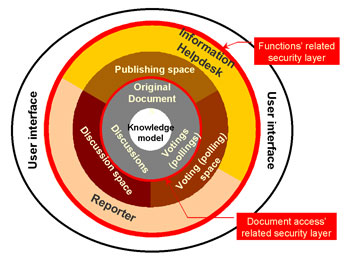
This issue in pdf Archive: |
|
|||
Knowledge Technologies in Support of e-Government and e-Democracyby Jan Paralic and Tomas Sabol 'Webocrat' is a Web-based system developed in the framework of the EC-funded R&D project Webocracy. This system is at the heart of the project that aims to establish efficient systems that provide effective and secure user-friendly tools, working methods and support mechanisms to ensure the efficient exchange of information between citizens and public administration institutions. The Webocrat system comprises modules and functions for content management, computer-mediated discussion, discussion forums, organisational memory, information retrieval, data mining, and knowledge modelling. The system will support communication and discussion, publication of documents on the Internet, browsing and navigation, opinion polling on questions of public interest, intelligent retrieval, user alerts, and convenient access to information based on individual needs. The development of the system will be complemented by the development of a methodological framework for implementing Webocrat-like systems. The approach of the project partners to implementation of the project objectives is 'user-driven' and 'user-centred'. All work within the project is based on the user requirements of three local authorities (user partners) involved in the project. The project objectives are refined in order to reflect user partners' needs.
The project's objectives are being assessed and further refined within the framework of pilot applications by the deployment and evaluation of the developed technologies and methodologies in naturalistic settings. This should ensure that the tools and methodologies delivered by the project will correspond to citizens' interests and needs, and will have the potential for further development. Briefly, it can be concluded that the functionality provided by the above-mentioned modules proved interesting and quite attractive for citizens. It is worth emphasising that this is only a minor part of the functionality that will offered by the whole Webocrat system, which will integrate all the above-mentioned modules. Hence, even the small number of available and tested Webocrat modules have the potential to increase citizen participation in local democracy and political processes in Wolverhampton and Kosice. On the other hand, issues with design, functionality, administration, support structures, targeting and reliability will need to be addressed before moving forward and beginning to deliver significant benefits in the future as part of a meaningful, valued and integrated consultation and participation process. Link: Please contact: Tomas Sabol (Project co-ordinator), Technical University of Kosice, Slovakia |
|||


